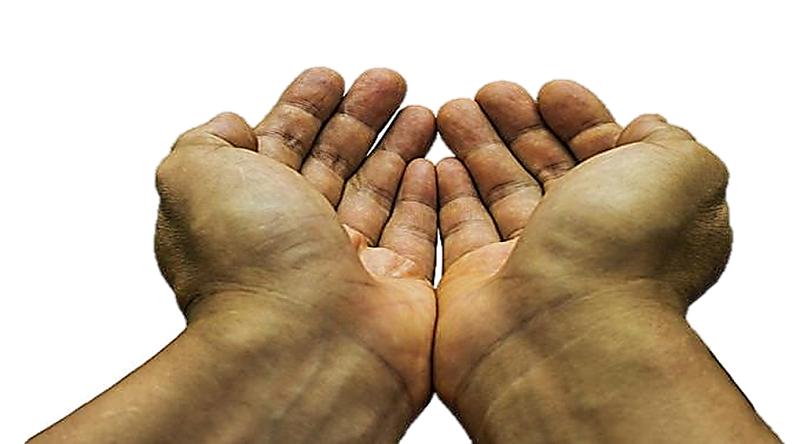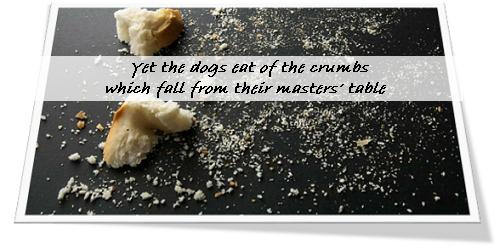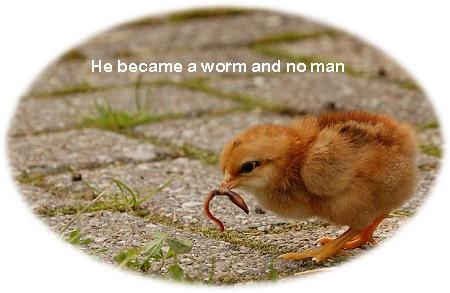The Healing of a Canaanite Woman’s Daughter
The Healing of a Canaanite Woman’s Daughter

In the late 1990s, when I lived for some months in Jerusalem, there were beggars daily at the gates of Jerusalem, holding out their hands. To me, they all looked like beggars would look emblems of misery by the side of the road, taking what you put in their hands and giving a grateful nod. On one occasion, a friend and I passed some beggars near one of the gates into the city, when, all of a sudden, we heard a cell phone go off, and a “beggar” jumped up and, out of his dingy bag, pulled his ringing cell phone and walked away to answer it. My friend and I moved out of the way, stunned, watching him. The “beggar’s” demeanor had changed completely. He started arguing with someone on the phone and soon left the spot to hail a taxi. I was dumbfounded until my friend explained that there are quite a few con artists who live normal lives in their apartments and dress up like beggars simply for gain.
Unlike the beggar I saw, the woman we meet in our text was a true beggar who obtained a great and gracious miracle, namely, the healing of her demon-possessed daughter.
A Needy Suppliant⤒🔗
In our passage, Christ was nearing the end of His Galilean ministry. He had taught many things and done many miracles, and the time was soon approaching that He would leave Galilee to go to Jerusalem. The opposition against Him had been increasing as well, to the point that He determined to withdraw to the northern edge of the Promised Land, into the region of Tyre and Sidon. This area was the home of many of the original Canaanites whom Israel had been commanded to drive out of the land. God had often sent judgments and curses on the Canaanites because of their iniquity.
This region of Tyre and Sidon, however, had enjoyed some tokens of favor in the past. In the former days of King David, Tyre’s king, Hiram, had been in league with David, and provided wood from the forests of this area for building the temple. Once, during a famine, Elijah had gone to the region and miraculously supplied oil and meal to a widow woman and her son to keep them alive.
Now in Jesus’ day there was another woman there who needed help. We read that this Canaanite woman came crying after Jesus, saying repeatedly, “O Lord, thou Son of David: my daughter is grievously vexed with a devil” (see Matt. 15:22). This unclean outcast of a woman had the devil breathing down her neck, as it were. He had her daughter in his grasp.
Notice that she called Jesus “the son of David.” She probably didn’t know the passage, but the Old Testament had prophesied that the Son of David would “deliver the needy when he crieth; the poor also, and him that hath no helper” (Ps. 72:12). Clearly, this woman had heard of Christ. Undoubtedly, she had heard of the many people who had been brought to Him for healing, and that He had healed them all, including people possessed by demons. Perhaps she had even heard how at one time He had spoken about her country when He had warned Chorazin and Bethsaida:
It shall be more tolerable for Tyre and Sidon ... than for you ... for if the mighty works ... done in thee, had been done in Tyre and Sidon, they would have repented in dust in ashes.Matthew 11:22
Clearly, the Holy Spirit had blessed whatever she had heard so that she had not simply heard it as the word of men, but as the word of God (1 Thess. 2:13). At the same time, her need was great. Every day, the devil would remind her of his power over her daughter. Who could help her against such a powerful force?

A Trying Savior←⤒🔗
We read of a number of trials that this needy woman met with on her way to the answer she sought. The first was the silence of Jesus. We read, “He answered her not a word” (Matt. 15:23). Her cries were so loud; Christ’s mouth, meanwhile, remained closed. It must have been something for her that hell seemed so open, but heaven so shut – a demon-possessed daughter on the one hand, and a silent Savior on the other.
Her second trial was the impatience of Christ’s disciples. This must have made matters worse for her. They sought Christ’s intervention to make her go away. “Send her away; for she crieth after us” (Matt. 15:23).
The third trial was the apparent rebuff of the Savior. When Christ finally did answer her, He said, “I am not sent but unto the lost sheep of the house of Israel” (Matt. 15:26). Indeed, for the most part Christ had limited Himself to those who were Israelites. To the woman it must have sounded as if, had she been an Israelite, Christ would have helped her. But sadly, she was a Canaanite.
What was the Savior doing to this woman? Doesn’t the Scripture say, “All that the Father giveth me shall come to me; and him that cometh to me I will in no wise cast out” (John 6:37)? Indeed, the Lord will not cast her out. Listen carefully to the Savior’s words. So often we interpret silence as denial and discouragement as total rejection. Yet, the all-wise Savior was putting her to the test to bring out the tenacity of her faith. He knew her faith before He tried her, just like the Lord knew Abraham’s faith before He tried him (see Gen. 22:1). Was He not the author and finisher of it (Heb. 12:2)?
Paradoxically, the woman took encouragement, even from the Savior’s apparent rebuff. Kneeling down before Him, she spoke simply and urgently: “Lord, help me” (Matt. 15:25). What a simple but clear glimpse into the heart of true prayer.
And yet the Lord was not done testing her. Now came the final trial for this woman, and arguably, the most severe. Jesus said, “It is not meet to take the children’s bread, and cast it to the dogs” (Matt. 15:26). Taken simply on the surface, this was an insult to the woman. It is as if He compared her to a yelping dog interrupting a father who is trying to feed his children.
It speaks to her faith that she seemed to have had her response ready.
Truth, Lord: yet the dogs eat of the crumbs which fall from their masters’ table.Matthew 15:2
If she had been offended by the Lord comparing her to an unclean animal, she would have missed the blessing the Lord was about to give her. But her eye was on one thing: the Lord’s help. She knew how helpless and hopeless she was without it. To be compared to a dog is a compliment if you know you deserve hell. She was content to be called a dog. Like Jacob, this woman would not take no for an answer. She knew that she had scavenged for food the whole world over, but had come up short with nothing to feed her empty soul.
A Rich Feast←⤒🔗
The triumph of the woman could scarcely have been greater. Not only was her daughter made whole from that very hour (v. 28), but Christ gave her so much more. Christ said to her: “Be it done unto thee even as thou wilt” (v. 28). Though she was content with a crumb, the Savior puts the whole of heaven wealth at her disposal. The Lord could do this because, on the cross, His body would be broken and His blood shed for a full atonement. He could cast out this devil because He would defeat him at the cross. He could give this woman a rich feast because He hungered and thirsted when under the displeasure of His Father for sinners like this woman. In other words, He became a worm and no man in order that outcasts like this woman might be accepted as sons and daughters. He took her hell in order to make her an heir of heaven.
Perhaps you have had long nights of silence, discouragement after discouragement, or even felt like hell was breathing upon you. But, while there is life, there is hope! This is the important question: Do you agree with what the Lord says about you in His Word? Do you agree that you are a dog, a leper, an outcast, and a rebel? Whatever He says, agree with Him quickly, wholeheartedly, for then the Lord’s answer is the same to you as it was to this woman: “be it unto you even as you will.”

Questions←⤒🔗
- From this passage and others, what help do you find for those who feel that their prayers are not being answered?
- How does the impatience of the disciples towards this woman convict us of our impatience at times with people who don’t fit a certain mold? What should this tell us about how we regard those with needs around us?
- Show how the woman's short prayer, “Lord, help me,” had all the main ingredients of true prayer.
- What do we learn from the woman about agreeing to what the Lord says about us in His Word? Why is that so difficult?
- Christ had just fed the five thousand (Matt. 14:15-21). Is there any connection between this woman's request for crumbs from the Master’s table?

Add new comment